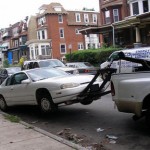 When an individual files a Chapter 7 bankruptcy case, one of the decisions they have to make is whether they want to keep property that is collateral for a loan, or to give it back to the lender.
When an individual files a Chapter 7 bankruptcy case, one of the decisions they have to make is whether they want to keep property that is collateral for a loan, or to give it back to the lender.
The best example is an auto loan: a debtor filing bankruptcy can choose to keep paying the loan and keep the car, or get rid of the loan and turn in the car to the lender.
But what happens if the lender refuses to take the collateral back?
This type of situation rarely ever happened until a few years ago. Up until then, creditors always took their collateral back!
But with the economic crash, things sometimes do fall through the cracks. And with the downturn in the economy, sometimes there is even an incentive for a lender not to take possession of the collateral.
Unfortunately there is a growing problem of lenders that are refusing to take possession of vehicles surrendered in bankruptcy. We see this not only with motor vehicles but we are also seeing this occasionally in housing. Because of low values some lenders are unwilling to to foreclose to the detriment of the neighborhood. The lender simply finds the cost of paying maintenance, insurance, and back taxes exceed the value of the home.
Back in 2006, the First Circuit court of appeals dealt with this situation in a case called In re Pratt. There, the court went so far as to say a debtor who was stuck with a car could go so far as to reopen their case and try to get the lender to be held in contempt of court! The Pratt case is binding precedent in both Massachusetts and New Hampshire.
The problem becomes more acute when houses are involved — especially condominiums. Due to a change in the bankruptcy laws, a debtor can be held on the hook for condo fees due AFTER the bankruptcy is filed if the lender refuses to foreclose– which can make clearing up title and selling a condo a nightmare, even after a bankruptcy case.
People stuck in this situation here in New England may consider hiring a bankruptcy lawyer and giving the Pratt route a try — there may be nothing better than a contempt of court motion needed to wake up a “sleeping” creditor who refuses to take back a home or car after learning of a debtor’s bankruptcy case
By Doug Beaton